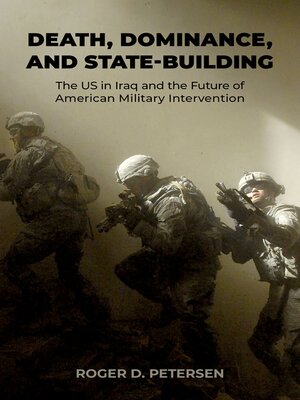Death, Dominance, and State-Building
ebook ∣ The US in Iraq and the Future of American Military Intervention
By Roger D. Petersen

Sign up to save your library
With an OverDrive account, you can save your favorite libraries for at-a-glance information about availability. Find out more about OverDrive accounts.
Find this title in Libby, the library reading app by OverDrive.



Search for a digital library with this title
Title found at these libraries:
| Loading... |
The definitive work on the course, conduct, and aftermath of the Iraq war. In Death, Dominance, and State-Building, the eminent scholar of conflict Roger D. Petersen provides the first comprehensive analytic history of post-invasion Iraq. Although the war is almost universally derided as one of the biggest foreign policy blunders of the post-Cold War era, Petersen argues that the course and conduct of the conflict is poorly understood. He begins by outlining an accessible framework for analyzing complex, fluid, and violent internal conflicts. He then applies that framework to a variety of diverse case studies to break down the strategic interplay among the US military forces and Shia and Sunni insurgent organizations as it played out in Baghdad, Anbar, and Hawija. Highlighting the struggle for dominance between Shia and Sunni in Baghdad, Petersen offers a reconsideration of the Surge. He also addresses failures of state-building in Iraqi Kurdistan. Critically, he shows how the legacy of the US occupation and presence from 2003-2011 shaped Iraq's political and security contours from 2011-2023. Comprehensive, analytically sophisticated, and subtle, this book draws lessons relevant to future American military interventions from what most regard as the US's most disastrous foreign policy adventure since Vietnam. The US cannot simply wish away insurgencies, which are always going to occur. The question is what the US and other great powers might do about them in the future.






